THE CAMPAIGN FOR THE UNIVERSITY OF SASKATCHEWAN
WITH YOUR SUPPORT,
USASK MEDICAL PRACTITIONERS AND RESEARCHERS WILL CHANGE
OUR WORLD

MEDICAL PROFESSIONALS
THE WORLD NEEDS
With your support, we will fulfill our vision: to improve the health and well-being of the people of Saskatchewan and the world.
By supporting the College of Medicine, you are ensuring that education, research and clinical care continues to improve and advance.
We are Saskatchewan’s only medical school. Your support means we can train the next generation of doctors and physical therapists and discover cutting-edge treatment for diseases in our province, for our province—and that means improved health and well-being for our people and communities.
LEAD CRITICAL RESEARCH
Research support from donors like you will enable USask to attract and retain world-class researchers and build capacity in critical areas—through their own work, by teaching the next generation of physicians and by collaborating with researchers around the world. Your gift will help accelerate the work that our scientists and educators wish to do in confronting the diseases that harm humanity.
Featured Projects:
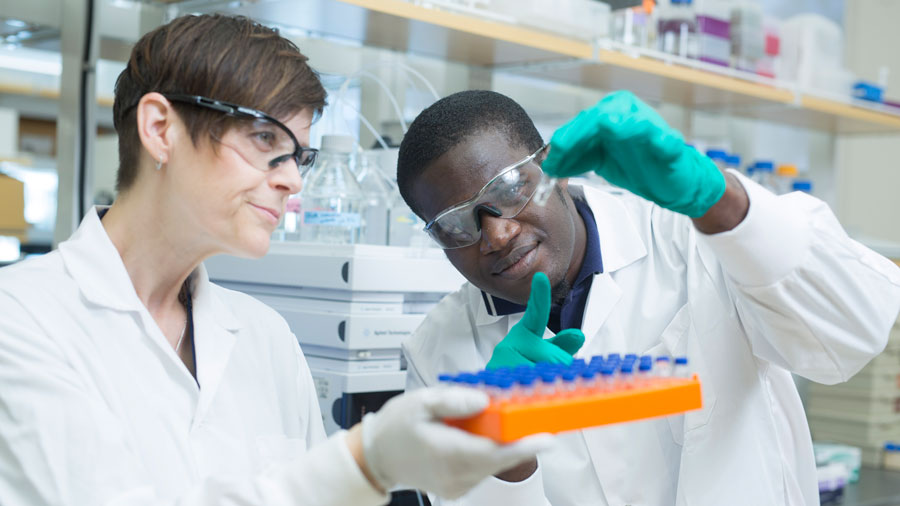
Bioinformatics Research
$3.5 MILLION GOAL
There exists large datasets nationally and internationally for cancer studies. The key to unlocking cancer could be buried within it. However, due to lack of sufficient expertise and specific training and funding, we have limited ability to utilize this “big data” which contains critical information.
The College of Medicine seeks to establish a chair in bioinformatics to significantly broaden the scope of research questions our local health sciences researchers can ask by providing expertise to use data generated anywhere in the world.
Support to this area of research will enable our health scientists to study this data, ask important questions about commonalities associated with the disease, identify new hypotheses to test and possibly develop new treatments.
USask Biobank
$1.5 MILLION GOAL
This critical biobank was created in 2021 because of a partnership between the Department of Anatomic Pathology and the Oncology program with the goal of creating an academic repository for tumor samples to be used for short- and long-term cancer research.
Development and sustainability of the biobank will increase the calibre of cancer care for all Saskatchewan patients and families. Information from the genomic and precision analysis of tumor specimens from the biobank allows for the most advanced care possibilities for every single patient.
The biobank is working on testing, delivering, and personalizing cancer treatments across the province to provide precision medicine to each cancer patient. Scientists with USask aim to have the capability to test a tumor for drug sensitivities and even design a drug for a specific patient’s tumor. However, the biobank requires significant investment and support to purchase the technology, equipment, and consumables to keep it operational and accelerate its work.
If you are interested in donating to either of these projects, please contact:
Medicine Advancement Office
University of Saskatchewan
College of Medicine
Tel: 306-966-2600
med.advancement@usask.ca
Women’s Heart Health
$1.5 MILLION GOAL
In Canada, heart disease is a leading cause of mortality in women. Annual mortality rates for heart disease in women in Canada exceed rates for breast cancer by 3 times, and rates for breast and all gynecological cancers combined by more than 2 times.
Women suffering from heart failure usually present late to the hospitals with atypical symptoms and too often receive identical treatment protocol as men. Additionally, we know that women suffer worse outcomes.
Our goal is to establish clinics in both Saskatoon and Regina along with rural satellite clinics, to provide women’s heart health education and care. Additionally, we aim to undertake research at the University of Saskatchewan to better understand the pathophysiology and hormonal impacts and body and arteries sizes of women in order to provide earlier diagnosis, improve survival rates, and save women who are suffering from heart damage from specific chemotherapy breast cancer treatment.
Cystic Fibrosis Research
$2 MILLION GOAL
Cystic Fibrosis (CF) is the most common fatal genetic disease affecting Canadian youth. Lung disease is a significant cause of mortality in the CF population and better treatments are still needed.
Support to this research will help develop a sustainable interdisciplinary CF research group. They will focus on patient-centered research to develop new treatments. Gifts to CF research will allow our research group to quickly meet the infrastructure and personnel needs of the work allowing the group to embark on human research and clinical trials to bring new treatments to market.
Obstructive Sleep Apnea (OSA) - the Silent Killer
$2 MILLION GOAL
Obstructive sleep apnea is associated with many serious health conditions (such as cardiac and cerebrovascular disease, depression and Type 2 diabetes), as well as safety concerns at the workplace. While evidence-based diagnostic and treatment modalities exist, undiagnosed sleep apnea is common and adherence to treatment is often poor. Despite its prevalence, OSA remains an under-diagnosed public health concern.
Understanding the priority research questions related to obstructive sleep apnea posed by patients, families, and employers will serve as guideposts to direct the endeavors of researchers, funders and educators to find solutions to pressing problems. Donor support would be pivotal in conducting this initial project and building the local expertise to conduct future projects related to priority setting exercises for other areas of research.
Therefore, the Respiratory Research Centre (RRC) is undertaking a Research Priority Setting Partnership on Obstructive Sleep Apnea (OSA) through the James Lind Alliance (JLA). The JLA is a non-profit initiative that brings together patients, families, clinicians and employers to identify and prioritize the top 10 uncertainties, or unanswered questions, in order to inform the research agenda of key stakeholder-oriented priorities for research. There are many unanswered research questions related to OSA that remain to be addressed and the USask’s RRC is well-positioned to take a leadership role in this area.
If you are interested in donating to any of these projects, please contact:
Medicine Advancement Office
University of Saskatchewan
College of Medicine
Tel: 306-966-2600
med.advancement@usask.ca
ER Medicine for Research in Vulnerable Populations
$3 MILLION GOAL
The Emergency Room (ER) is the gateway to the hospital and place of last resort for our rural and vulnerable patients. The ER is the ideal setting in which to study these populations because when our health and social safety net fails, it is where they turn. The study of these patients and the system failures that lead them to seek care has the potential to identify the systemic problems and propose solutions. Support of this project will fund powerful research to determine the how, why and when these populations access emergency rooms and allow us to propose targeted solutions that will inform health policy for future generations.
Rural Health
$4 MILLION GOAL
There is a crucial need in Saskatchewan and Canada for complementary and comprehensive research into the specific health needs, issues, risks and exposures faced by rural residents at home and in the workplace. Almost 15 per cent of the population of Saskatchewan is aged 65 and over, and many of them still work. Older adults are more likely to live in rural areas in Saskatchewan, and rural adults with illnesses such as dementia face multiple disparities accessing healthcare services. Donors and our community can lead the way by helping the College of Medicine establish a Research Chair in this area to do the important work that will benefit the rural populations and communities of Saskatchewan including farmers and their families, rural at-risk populations including indigenous communities and temporary foreign workers.
If you are interested in donating to either of these projects, please contact:
Medicine Advancement Office
University of Saskatchewan
College of Medicine
Tel: 306-966-2600
med.advancement@usask.ca
Discovering the Earliest Origins of Health and Disease
$4 MILLION GOAL
Most diseases have their origins long before the disease becomes apparent. There is compelling support for the view that many chronic diseases have their origins during childhood or even prenatally. The College of Medicine seeks to establish a longitude research program led by a clinical scientist research chair that will help expose their causes and mechanisms and guide effective and rationally conceived treatment and prevention strategies to benefit children now and into their adulthoods.
If you are interested in donating to this project, please contact:
Medicine Advancement Office
University of Saskatchewan
College of Medicine
Tel: 306-966-2600
med.advancement@usask.ca
Neuroscience Research
$5 MILLION GOAL
In Canada, approximately 3.6 million people are living with at least one neurological condition, and one in five Canadians will experience a mental illness throughout their lifetime.
Our researchers aim to establish a Saskatchewan Brain and Mental Health Institute, an innovative multidisciplinary institution that focuses on understanding the brain to advance discovery and translational neurosciences for the prevention and treatment of neurological and neuropsychiatric disorders.
We require research labs with state-of-the-art infrastructure and the recruitment of outstanding scientists to help discover new treatments for debilitating neurological and psychiatric disorders, to enhance research to protect mental health and improve the lives of patients coping with brain diseases.
Alzheimer’s Disease
$3 MILLION GOAL
The College of Medicine is on the cusp of something transformational.
Our teams are poised to conduct a phase II clinical study right here in Saskatchewan to evaluate the efficacy of NeuroEPO in early-stage Alzheimer’s participants.
This breakthrough treatment has already demonstrated it can stop the progression of cognitive decline in 82 per cent of the patient participants, improve cognitive performance in 54 per cent of patients after administration of NeuroEPO and increase blood flow to brain areas previously impacted as a result of Alzheimer’s disease in 56 per cent of the Alzheimer participants.
However, donor support is needed to accelerate this research through phase II clinical trials right here in Saskatchewan. This investment is pivotal to the clinical development process and ultimately regulatory approval by Health Canada for standard of care for Alzheimer’s disease.
MS and ALS Research
$3 MILLION GOAL
Saskatchewan has one of the highest rates of multiple sclerosis (MS) in Canada.
Current MS drug therapies only supress inflammation and not address the nerve cell damage taking place. To date, there are no drugs that prevent nerve cell damage.
But at the College of Medicine, we have discovered how nerve cells in multiple sclerosis and amyotrophic lateral sclerosis (ALS) are damaged and ultimately die, and more importantly, we have discovered how to stop it.
Our next step is to test drug toxicity and efficacy in mice, thereby creating a list of medicines for use in clinical trials to treat MS and ALS, for which current therapies provide little relief. Donor support will help us get these novel drugs into clinical trials as soon as possible.
If you are interested in donating to any of these projects, please contact:
Medicine Advancement Office
University of Saskatchewan
College of Medicine
Tel: 306-966-2600
med.advancement@usask.ca
SUPPORT INDIGENOUS ACHIEVEMENT
Our researchers and clinicians participate in collaborative and mutually beneficial partnerships aimed at improving the health of Indigenous people and communities in culturally appropriate ways.
Featured Projects:
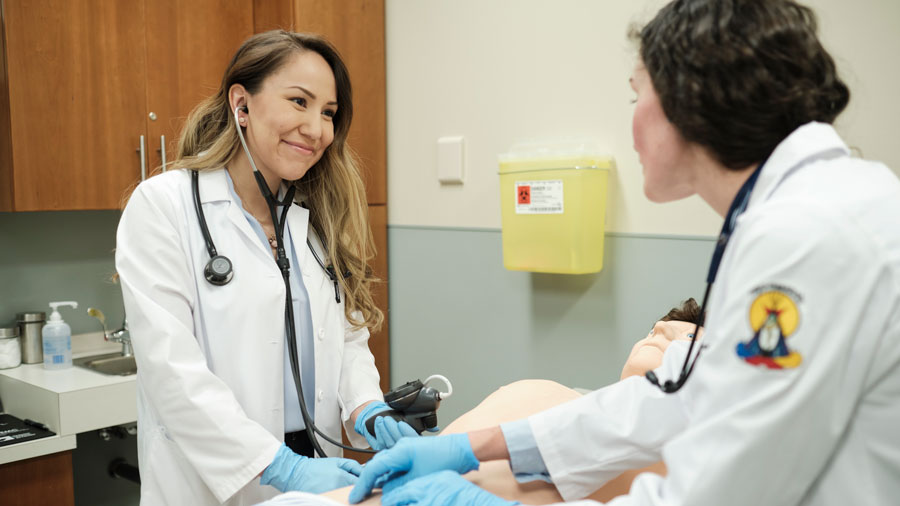
$1 MILLION GOAL
This new centre will feature expertise in the use of technology to address health-care disparities that exist for rural and remote Canadians (30 per cent of Saskatchewan’s population), including Indigenous populations. Access to health care in rural and remote regions of Saskatchewan and across Canada are limited by several barriers including geography, access to practitioners, availability of services and transportation.
A Centre for Best Practice will be a collaborative unit where community directs and leads the questions and evaluations, in partnership with researchers and educators. With your generous support, we can champion culturally responsive care and ensure that more people have the access to the health care they need and deserve.
If you are interested in donating to this project, please contact:
Medicine Advancement Office
University of Saskatchewan
College of Medicine
Tel: 306-966-2600
med.advancement@usask.ca
$1.5 MILLION GOAL
The emergency department is the gateway to the hospital and place of last resort for our vulnerable patients.
Numerous patient populations can be considered vulnerable and may include the elderly, patients struggling with addictions, and indigenous patients. Rural populations also face unique healthcare challenges due to their distance from tertiary care centers.
The emergency department is the ideal setting in which to study these populations because when our health and social safety net fails, it is where vulnerable patients turn for help. The study of these patients and the systems failures that lead them to seek care has the potential to identify the systemic problems and propose solutions.
If you are interested in donating to this project, please contact:
Medicine Advancement Office
University of Saskatchewan
College of Medicine
Tel: 306-966-2600
med.advancement@usask.ca
INSPIRE STUDENTS TO SUCCEED
Your donations will ease medical students’ financial burdens and allow them to concentrate on their studies. Your support will inspire the next generation of leaders in medicine and will ensure doctors in Saskatchewan reflect the population and the people they serve.
Featured Projects:
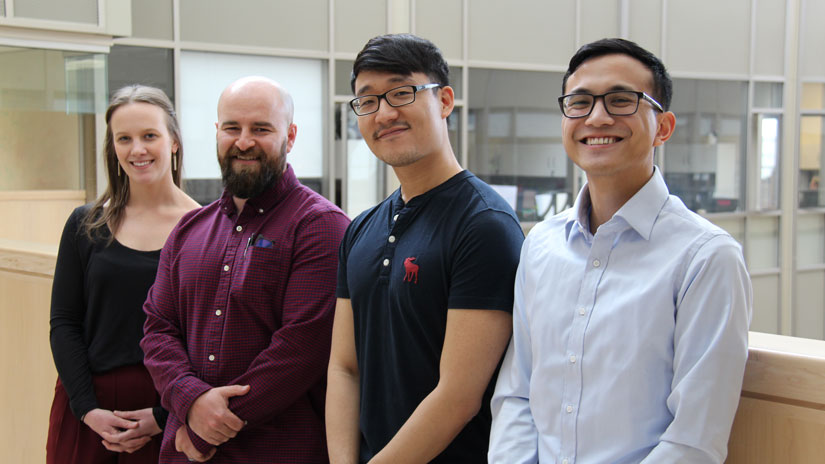
$1.5 MILLION GOAL
With medical school tuition fees reaching $100,000, support in the form of scholarships, bursaries, and awards is a critical component ensuring students have assistance to reach their educational goals.
Thanks to your generosity, Indigenous students, students from rural areas, and those who have experienced socio-economic challenges will have the opportunity to pursue their dreams of graduating from medical school without worrying about financing their education.
Your donations will ease medical students’ financial burdens and allow them to concentrate on their studies. Your support will inspire the next generation of leaders in medicine and will ensure doctors in Saskatchewan reflect the population and the people they serve.
If you are interested in donating to this project, please contact:
Medicine Advancement Office
University of Saskatchewan
College of Medicine
Tel: 306-966-2600
med.advancement@usask.ca
DESIGN VISIONARY SPACES
Your support of new state-of-the-art labs and much-needed infrastructure will support our researchers, better prepare physicians and improve patient outcomes. By investing in simulation-based training using the latest technology, IT and equipment, we will make training more efficient while improving doctors’ skill performance and increase patient safety.
Featured Projects:
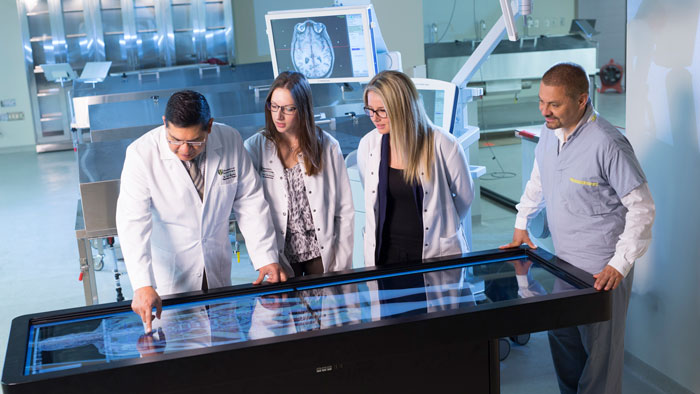
$3.5 MILLION GOAL WITH NAMING OPPORTUNITY
Your support of this new, state-of-the-art surgical lab will better prepare physicians and improve patient outcomes.
By investing in simulation-based training using the latest technology, IT and equipment, we will make training more efficient while improving doctors’ skill performance and increase patient safety.
We have replicated a state of the art operating room so surgeons-in-training have many opportunities for deliberate practice in a realistic, controlled, and mentored environment before they operate on real patients. However, the best and most current surgical equipment, IT and technology is required to ensure the highest quality of education for our surgical students.
This lab will directly support over 100 first-year students in health sciences, more than 120 senior year students, and over 200 residents annually. Your donation to this area will help us attract top students, faculty, residents, and researchers, and ensure our training programs remain accredited.
$1.5 MILLION GOAL
With donor support, our college will be able to invest in the necessary mass spectrometry equipment, to enable our researchers to better be able to analyze and advance research in the areas of cancer, neurobiology, cell biology, microbiology, biochemistry, immunology, pharmacology, and physiology in this facility.
Through the support of donors like you, researchers will have access to the much-needed infrastructure to study all cellular proteins at the same time. This technology will help researchers address fundamental questions about how protein levels change or are modified to impact their cellular function because of diseases and infections. Your investment will advance our understanding and ability to develop new tests and treatments for diseases such as cancer, Parkinson’s, Alzheimer’s, and multiple sclerosis.
If you are interested in donating to this project, please contact:
Medicine Advancement Office
University of Saskatchewan
College of Medicine
Tel: 306-966-2600
med.advancement@usask.ca
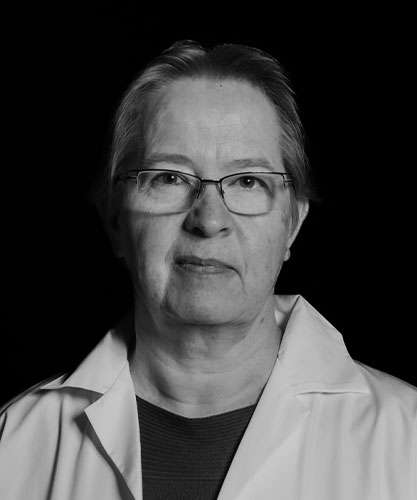
“Cancer affects all of us in such a profound way. My team at the College of Medicine and I are devoted to discovering new and more effective ways to treat cancer. At USask, we are focusing on the development of new treatments for Precision Medicine to deliver the right treatment for the right patient at the right time in cancer care.”
Dr. Deborah Anderson
Professor, Department of Oncology, College of Medicine, and Director of Research, Research Department, Saskatchewan Cancer Agency
Support the College of Medicine
Together, we can transform medical education and research so that vulnerable people are not left behind and medical research is a priority.
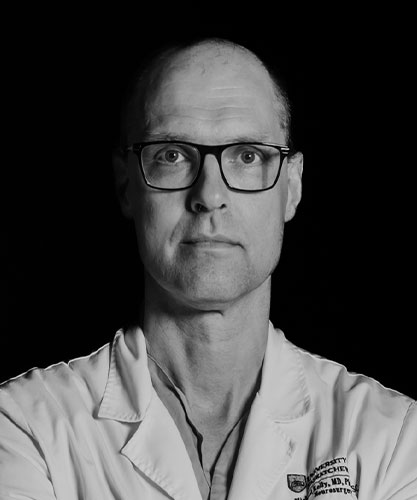
“Stroke is one of the leading causes of death in Canada. The research conducted by our teams at the College of Medicine has implications for the whole world to better understand how to help patients recover from stroke and other brain trauma.”
Dr. Michael Kelly (BSc'95, MD'99, PhD'11)
The Knight Family Enhancement Chair in Neurological Surgery, Provincial Department Head of Surgery, Saskatchewan Health Authority, and professor of Neurosurgery, College of Medicine

